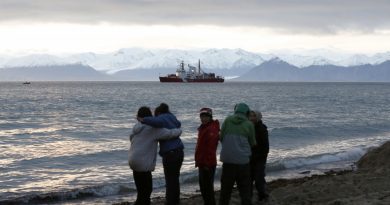Arctic’s Last Ice Area losing twice as much ice compared to rest of region: Study

Research showed August 2020 had a record-low sea ice concentration in the area
The Arctic’s Last Ice Area is losing ice mass at twice the rate of the entire Arctic, shows new research published on Thursday in the journal Communications Earth and Environment.
It was led by the University of Washington and co-authored by Kent Moore, a professor at the University of Toronto. The research used satellite data and sea ice models to determine that August 2020 — the warmest year on record — showed a record-low of just 50 per cent sea ice concentration in the Last Ice Area.
A region north of Greenland and the islands of the Canadian Arctic Archipelago, Moore said the area is important to the Arctic because its sea ice helps regulate temperatures by reflecting radiation from the sun.
“[Sea ice] acts almost like an air conditioner,” Moore said, “because the heat isn’t being absorbed.”
The study focused on sea ice in August 2020 in the Wandel Sea, an area in the Arctic Ocean that used to be covered year-round in thick, multi-year ice.
It used satellite data and sea ice models to determine what caused last summer’s record low, and found that about 80 per cent was due to weather-related factors, like winds that break up and move the ice around. The other 20 per cent was from the longer-term thinning of multi-year sea ice — which refers to ice that persists from one year to the next — due to global warming.
Impact on animal populations
There will always be ice in the Arctic in the winter, according to Moore, but the loss of multi-year sea ice means the Last Ice Area may no longer have ice in the summer. This is important because the region also acts as a refuge for Arctic wildlife like polar bears and seals.
The decline in sea ice could lead to the decline in animal populations, which Moore said could have an indirect impact on the Inuit communities that rely on them.
He also said changing ice conditions in the Arctic is reshaping the traditional knowledge that Inuit communities have of their lands.
“Now, just because the ice is melting earlier and it’s freezing later — all the knowledge [Inuit communities] have is kind of being lost,” he said.
Moving forward, Moore said it’s important to ensure the Arctic is protected by making sure its resources are not exploited and the right policies are in place.
He also said it’s important for Canada to meet its target of net-zero carbon emissions by 2050, which “will be the ultimate thing that will save these areas” and the species that rely on them for refuge.
Related stories from around the North:
Canada: ‘Prolonged, dangerous and historic’ heat wave bakes much of western Canada, including North, The Canadian Press
Greenland: Tipping points: can a leaked report tip the scales to climate action? Blog by Irene Quaile
Norway: Polar bears face extinction in Svalbard and Arctic Russia says scientist, The Independent Barents Observer
Russia: Record breaking temperatures recorded in Arctic Russia, Eye on the Arctic
Sweden: Sweden’s wildfire season later than usual, Radio Sweden



